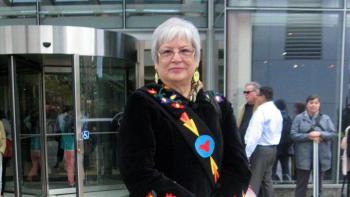Image Caption
Summary
Local Journalism Initiative Reporter
Windspeaker.com
Marilyn Buffalo has a suggestion for Premier Jason Kenney to help alleviate his concerns about how new COVID-19 restrictions will impact the mental health of Alberta’s most vulnerable populations: Fund the Nechi Institute.
Yesterday, the United Conservative government declared a public health emergency and announced a slate of targeted measures to lower the record-setting numbers of coronavirus positive cases. Many were province-wide, while some were specific to the greater Edmonton and Calgary regions.
In an emotional address, Kenney said he was concerned about “deepening the mental health crisis” with the restrictions, and talked about the anxiety and depression that continues to be an issue since the first province-wide lockdown last March.
Buffalo, CEO of the Nechi Institute, had her own emotional address at the end of October, when she posted on social media, “I hate asking for support resolutions from elected officials while we are in drug crisis and our family members are dying! We at Nechi Institute do not have capacity to respond.”
Her post goes on to say, “…We applied for funding to federal and provincial governments and we are denied!”
Speaking with Windspeaker.com yesterday, Buffalo said that although the addictions issue has “always (been) very high”, the pandemic and self-isolation has made the mental health crisis more obvious.
“I’m asking for more resources for Nechi Institute to be able to train individuals, our First Nations, Métis individuals in the community to assist the politicians and our community leaders on how to come up with their own strategies and how to tackle the issues of addictions in the communities and the general health and well-being of our people,” she said.
The Nechi Institute is a privately funded organization that has been training therapists and addictions counsellors from Indigenous communities since 1974. In 1984, it moved into the former Edmonton residential school on the outskirts of St. Albert, along with Poundmaker’s Lodge Treatment Centre.
In March, the Nechi Institute was forced to take up residence in three “mouldy, decrepit” trailers the institute owned, said Buffalo, next door to Poundmaker’s. Nechi was evicted from its home of 36 years by the provincial government when the province decided to use that space for more detoxification and treatment bed access.
Poundmaker’s treatment centre gets government dollars. In 2019-2020, Poundmaker’s received $3.1 million from Alberta Health Services, representing 68 per cent of the centre’s funding.
In its new location now, Buffalo says Nechi has had to pare down its services considerably.
“We’ve absolutely dropped some of our services and training because of the eviction. All our specialty courses and training because we don’t have the residence anymore. We didn’t have the beds and were not able to gain access to a facility that has beds. All our training centre we’ve lost,” said Buffalo.
This is a “critical time” for mental health issues, she said.
“Everybody knows that the opioid crisis is at an all time high. It’s very, very obvious with the high death rate and so forth in the community,” she said.
In September, Alberta Health released a report on the opioid response during COVID-19.
“For our vulnerable populations, including those struggling with substance use disorder, (they) have faced even more adversity in accessing the supports and services they depend on, compounded by increasing stress and anxiety,” reads the report.
“Beginning in March 2020, the number of harms associated with opioid use began to increase significantly, reaching record levels not previously seen, in conjunction with a decrease in the utilization of treatment and harm reduction services…. Prior to the COVID-19 pandemic, provincial efforts to reduce unintentional opioid poisoning deaths had been having a positive impact,” the report continued.
Training from Nechi Institute of individuals who can help communities build wellness plans is needed more than ever now, said Buffalo.
“It’s unthinkable in this day and age in 2020 that Nechi would not be supported by the governments to do this critical work and build the capacity to tackle the issues regarding addictions and the peoples’ well-being,” she said.
In December 2019 at its annual general assembly, the Assembly of First Nations passed a resolution supporting the Nechi Institute. In March, the AFN followed-up with a letter of support for Nechi, acknowledging Nechi’s “contributions to the wellness of First Nations in Alberta and other regions through training and education.”

